Current location: Home > NEWS > Industry news
NEWS
PRODUCTS
Brief introduction Molecular characteristics of microsatellite instability (gastric cancer)
News source: Release time:[2024-10-10]
Background
In 2022, there were more than 968,000 new cases of gastric cancer and nearly 660,000 deaths, ranking fifth in the world in terms of morbidity and mortality. Gastric cancer is one of the most common malignant tumors worldwide, and China has a large incidence of gastric cancer. Nearly half of the new cases of gastric cancer and deaths in the world are in China. The proportion of early gastric cancer in China is only about 20%, and most patients are locally advanced or advanced when they are found, with poor prognosis.
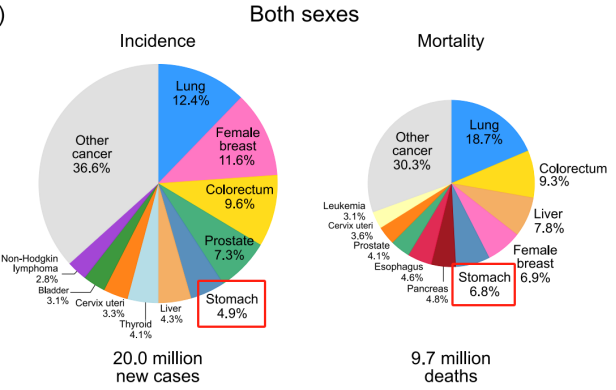
Type of gastric cancer
According to the molecular classification of cancer genomic atlas (TCGA), gastric cancer can be divided into four subtypes, i.e., microsatellite instability (MSI), chromosomal instability (CIN), EB virus positivity (EBV) and genomic stability (GS).
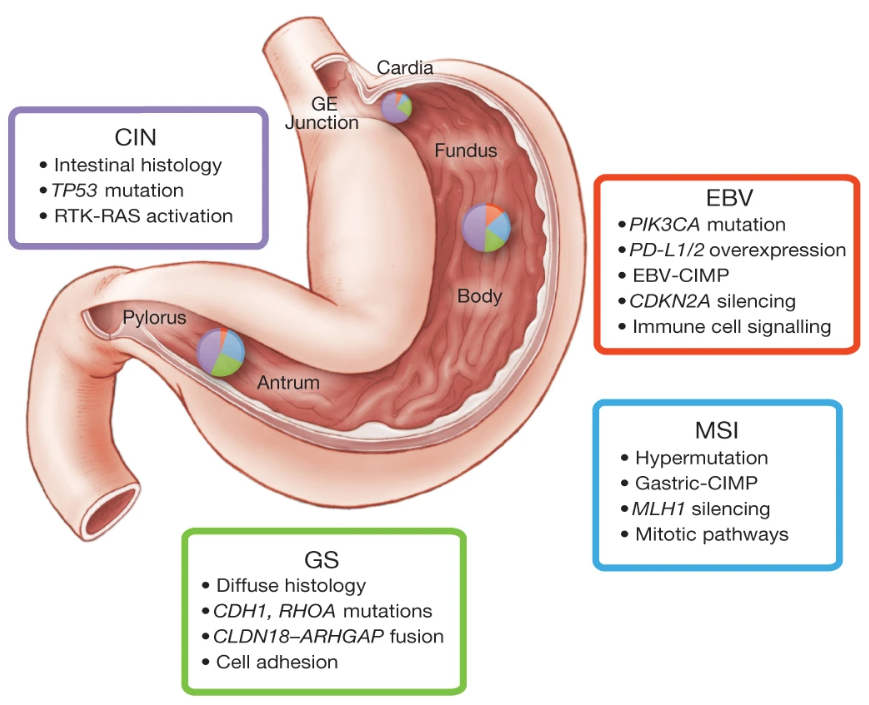 Main features of gastric cancer subtypes
Main features of gastric cancer subtypes
Clinical pathology and molecular characteristics of MSI-H/dMMR gastric cancer
MSI-H/dMMR and microsatellite instability (MSS)/ high-potency MMR(pMMR) GC are separate entities with widely differing genomic and immunogenic characteristics as well as clinical pathology.
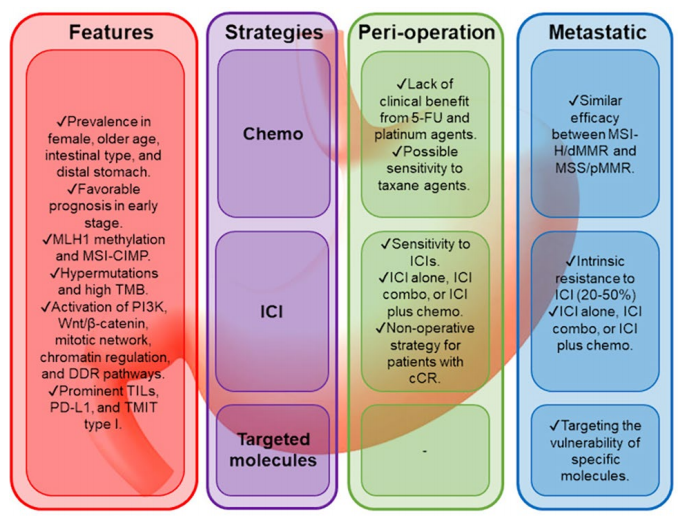
Characteristics and effective treatment of MSI-H/dMMR GC
Molecular characteristics of MSI-H/dMMR gastric cancer
The development of quantitative genome technology in Qualcomm has enabled people to have a deeper understanding of the molecular characteristics of MSI-H / dMMR GC. Recurrent MSI is frequently observed in specific gene clusters including immune response, DNA damage response (DDR), chromatin regulation, and transforming growth factor beta (TGF-β) in 23 tumor types. MSI-H/dMMR GC frequently exhibits dysregulation of signaling pathways including phosphatidylinositol 4,5-bisphosphate -3- kinase (PI3K)/ phosphatase and protein homologue (PTEN)/ mammalian target of rapamycin (mTOR), Wnt/β- catenin, mitotic networks, chromatin regulation, DDR, and MMRs.
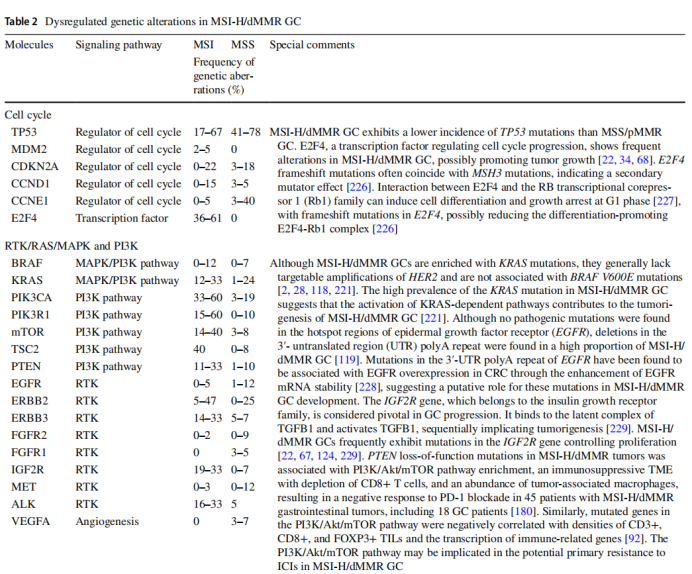
Immunologic characteristics of MSI-H/dMMR gastric cancer
The frequent occurrence of nonsynonymous point mutations and frameshift mutations produces a large number of immunogenic novel antigens on the MHC class I molecules of tumor cells and MHC class I and II molecules of antigen-presenting cells, enabling T cells to recognize them as non-self components and recruit T cells within tumors as tumor-infiltrating lymphocytes (TILs). In fact, MSI-H GC has obvious TILs characteristics. In addition, MSI-H/dMMR GC is abundant in M1 macrophages and natural killer (NK) cells as well as activated CD8+ cytotoxic T lymphocytes and Th1 helper cells characterized by an interferon-γ (IFN-γ) response.
Effective therapeutic strategies for MSI-H/ dMMR gastric cancer
We summarize the results of previous studies and discuss potential therapeutic strategies for patients with MSI-H/dMMR GC. These strategies include dual immune checkpoint blockade, antibodies with molecular targeting drugs that bind PD-1/PD-L1, and targeting vulnerability with selective molecular inhibition.
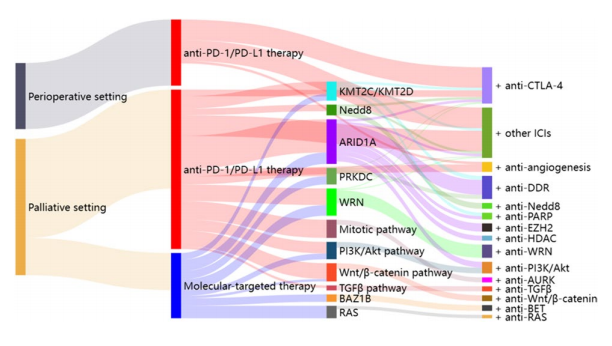
Summary of effective therapeutic strategies for MSI-H/dMMR GC
The status of immunotherapy in the first and second line of advanced gastric cancer has been confirmed. The perioperative clinical research of advanced gastric cancer is in full swing and we have seen the dawn of hope. A comprehensive and in-depth study of the complex interaction mechanism in the tumor microenvironment will provide a theoretical basis for the combination of immunotherapy with chemotherapy drugs and targeted drugs, and explore and solve the related problems of targeted therapy and immunotherapy in clinical practice, which will surely bring us significant changes in the treatment of gastric cancer.
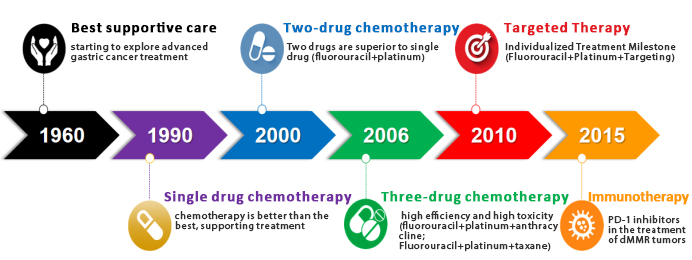
History of treatment of gastric cancer
Concluding Remarks
MSI-H/dMMR GC is a unique subtype with specific molecular characteristics and clinical significance. Detection of MSI or MMR status should be standard practice in guiding treatment choices for GC patients. Immunotherapy has shown that desirable GC and neoadjuvant ICIs for metastatic MSI-H/dMMR have an impact on organ retention strategies. However, MSI-H/dMMR GC showed significant heterogeneity in genomic, immunological, and clinical findings, and a subgroup of treated patients with ICI showing primary resistance.
References:
[1] Gastric Cancer https://doi.org/10.1007/s10120-024-01523-4
[2] Gastric cancer targeting and immunotherapy progress
[3] Nature volume 513, pages202–209 (2014)